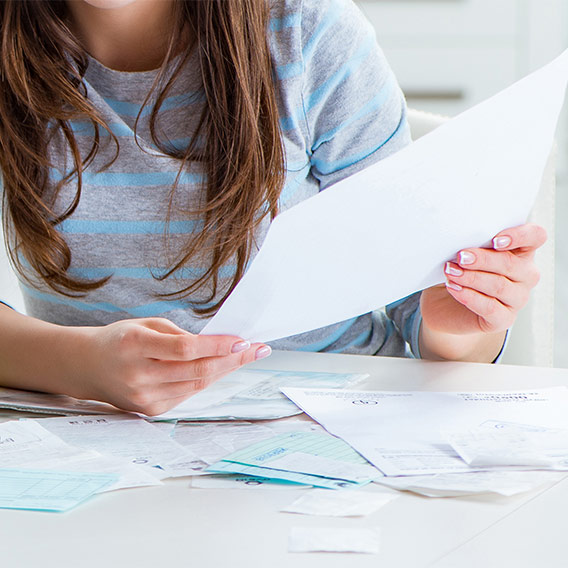PERSONAL LOAN
Are Personal Loans Secured or Unsecured?
EXPECTED READ TIME: 5 MINUTES
Personal loans are one of the simplest and most flexible ways to borrow money. Whether you’re replacing your roof or paying for your wedding, a personal loan can help spread out the costs.
Although personal loans are usually unsecured, some lenders offer secured loans. Is one type better than other? That depends on your financial situation. Here’s why.

What’s the Difference Between a Secured and Unsecured Loan?
The main difference between a secured and an unsecured loan is that you’ll have to offer collateral to get a secured loan while you won’t with an unsecured loan. That difference is a big one, though, and can affect how difficult it will be to get approved and how much you’ll pay for your loan.
Secured loans are usually cheaper than unsecured loans because your lender is taking less of a risk whenever you offer collateral. After all, even if you don’t pay, the lender will get something valuable in return for the money they loaned you. And because there’s less risk involved, it’s usually easier to qualify for secured loans. Many lenders also offer higher borrowing limits for secured loans.
Collateral is something of value that you promise to give a lender if you don’t repay your loan.
Another important difference is that lenders often place more restrictions on how you can use secured loans while they’re more flexible with how you use unsecured loans.
Secured Personal Loans |
Unsecured Personal Loans |
|---|---|
Requires collateral |
Does not require collateral |
Easier approval process |
Requires higher credit score |
Usually offers lower APR |
Usually offers higher APR |
Often has higher borrowing limits |
Often has lower borrowing limits |
May have more limits on how you use the loan |
Usually has fewer limits on how you can use the loan |
What Is an Example of Collateral?
Collateral is something of value that you promise to give a lender if you don’t repay your loan. For example, when you finance a car, your car acts as collateral. If you don’t make your loan payments, then your lender has the right to take your car instead.
You can use lots of things as collateral, but some common types include:
- Vehicles
- Bank accounts (including checking, savings, and money market accounts)
- Investments (such as stocks, bonds, or mutual funds)
- Insurance policies
- Property (whether residential, commercial, or undeveloped)
- Valuables like art, jewelry, or collectibles (such as rare stamps or coins)
What Happens to My Collateral Once My Loan is Repaid?
Your lender will place a lien on the collateral you offer once you take out your loan. A lien is a formal, legal claim on an asset — the thing you offer as collateral. This lien is removed once you make your final payment on your loan, and you’ll get to keep your asset.
You might choose a secured loan if you’re having trouble getting approved for an unsecured loan.
When Should I Take Out a Secured Loan?
There’s no hard rule about when to use a secured loan, but people are more likely to use a secured loan when they borrow large amounts of money to make a purchase such as a house, car, or boat. In these cases, the property being purchased usually acts as the collateral for the loan. You could also use a type of secured loan — known as a home equity loan — to cover major home repairs.
You might also choose a secured loan if you’re having trouble getting approved for an unsecured loan. Many lenders expect borrowers to have a FICO credit score of 690 or higher to qualify for unsecured loans. While you may still qualify for an unsecured loan even if your credit score is lower than that, you could end up paying much higher interest than you would if you used a secured loan instead.
When Would I Get an Unsecured Loan?
One reason to get an unsecured loan is because you either don’t have anything to offer for collateral, or because you don’t want to risk losing collateral if you can’t repay your loan.
You may also choose an unsecured loan if you have a high credit score. If you have a credit score of 720 or higher, then you’ll often qualify for lower interest rates anyway and there’s less benefit to backing your loan with collateral.
Many people choose to use an unsecured loan when they’re borrowing a smaller sum of money. For instance, you might use an unsecured loan to cover a kitchen remodel or to consolidate credit card debt at a lower interest rate.
You may also choose an unsecured loan if you have a high credit score.
Will a Secured Personal Loan Help My Credit?
Unsecured personal loans have the same impact on your credit score as secured loans. In both cases, applying for the loan can temporarily lower your score because your lender will conduct a hard credit check during your approval process.
Actually taking out the loan can also lower your credit score because it:
- Increases your credit utilization
- Lowers the average age of your credit accounts
- Increases your debt-to-income ratio
However, you can also use both secured and unsecured personal loans to raise your credit score, too. Making full payments on time will improve your payment history, which is the biggest factor affecting your credit score.
Unsecured personal loans have the same impact on your credit score as secured loans.
Where Can I Get a Personal Loan?
You can get a secured or unsecured personal loan from banks, credit unions, or online lenders. If you already have accounts with a financial institution, that’s a good place to start. But be sure to compare different lenders before signing on the dotted line.
Since each lender sets their own rules for how they lend, you might get better terms from one lender than another. You can also take advantage of pre-qualification to ensure you find the best rate without damaging your credit score.
Generally speaking, credit unions offer the best loan rates and tend to be more forgiving of weaker credit scores.
Generally speaking, credit unions offer the best loan rates and tend to be more forgiving of weaker credit scores. Just be aware that most credit unions will expect you to become a member, which usually involves opening a checking or savings account. (On the bright side, you can then take advantage of all their great member benefits!)
The Takeaway
While most personal loans are unsecured, there are some advantages to opting for a secured loan instead. If you’re borrowing more money, looking for a lower interest rate, or struggling to qualify, then offering collateral can be a great option. It all comes down to choosing the type of loan that best fits your goals.
Learn More About Personal Loans From PenFed
Discover the diverse offering of products, services, and support available to our members.




